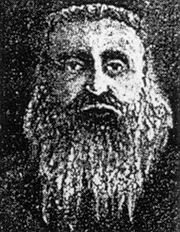Intelligent and Knowledgeable Words
Wednesday, April 23rd, 2014Click here for Hebrew text.
The Yahrzeit of Reb Chaim Halberstam of Sanz (“Divrei Chaim”) (1793-1876) is commemorated on the 28th of Nissan. The following meise / hasidic tale appeared in Sefer HaHasidut, Meah Tzadikim, Raphael, Yitzchak, 1961, Tel Aviv. (Freely translated by Gabbai Seth Fishman.)
He Tests the Passersby
Once, the holy Rabbi of Tsanz stood by a window in his house and, when he saw a man passing by, he tapped on the window and indicated that the man should come to him.
The man came inside and the holy Rabbi asked him:
“Please answer this question for me:
“If you came across something that you found, for instance, a bag of gold dinars, would you turn in the lost item to its owner?”
And the man answered:
“Rabbi, to be sure, I would hand back the lost item immediately, and right away, with no hesitation.”
And the holy Rabbi said to him:
“You are not very wise”.
Again, he stood by the window and when another man passed by, he indicated for the second man to come into the house.
And this man entered and, when he asked him the same thing, he answered:
“I am not such a fool as to return a purse with silver coins. I would not return silver that comes into my possession!”
And the holy Rabbi said:
“You are wicked”.
Once again, he stood by the window and when another man passed by, he indicated for this one also to come into the house. He did so, and then he asked him the same thing.
The man answered him:
“Rabbi, how could I possibly know at this moment, in advance, what my reaction would be at that time.
“Who knows if it would be possible for me, at that time, to conquer my desire to keep the silver because, there’s a possibility that the temptation might, God forbid, overrule my better judgment and incite me to absorb those forces that would have me err.
“Or else, on the other hand, perhaps it would happen that Hashem Yitbarach will bolster my strength so I can overcome the desire and so I can return the lost thing to its owner.”
And the Holy Rabbi said to him:
“How convincing your words are! Indeed you are truly wise and your words are spoken with intelligence and knowledge!”
(Source of Life 165)
